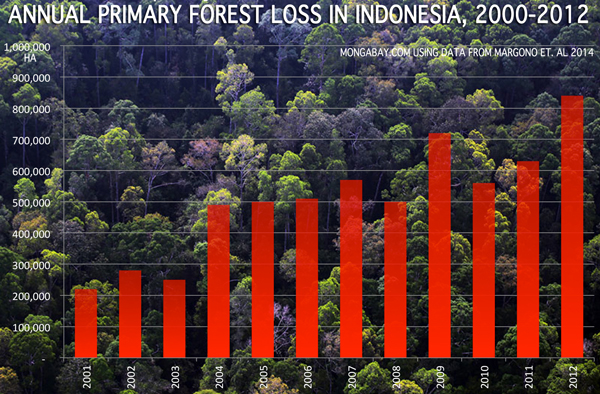Despite moratorium, Indonesia now has world's highest deforestation rate
By Mongabay.com
29 Jun 2014

Despite a high-level pledge to combat deforestation and a nationwide moratorium on new logging and plantation concessions, deforestation has continued to rise in Indonesia, according to a new study published in Nature Climate Change. Annual forest loss in the southeast Asian nation is now the highest in the world, exceeding even Brazil, Mongabay.com reported.
The study, led by researchers at the University of Maryland (UMD), is based on analysis of high resolution satellite data. Unlike previous research, the new paper distinguishes between loss of natural forest — which it calls "primary forest" — and cyclical harvesting of industrial plantations.
The study finds that Indonesia lost more than 6 million hectares of natural forest between 2000 and 2012. Worryingly, forest loss is trending upwards in the country despite hundreds of millions of dollars being spent by donors and the government on programs to cut deforestation. Deforestation was highest in 2012, the last year of the study.
The study, led by researchers at the University of Maryland (UMD), is based on analysis of high resolution satellite data. Unlike previous research, the new paper distinguishes between loss of natural forest — which it calls "primary forest" — and cyclical harvesting of industrial plantations.
The study finds that Indonesia lost more than 6 million hectares of natural forest between 2000 and 2012. Worryingly, forest loss is trending upwards in the country despite hundreds of millions of dollars being spent by donors and the government on programs to cut deforestation. Deforestation was highest in 2012, the last year of the study.
"We quantified increasing loss of primary forest during the moratorium, meaning the moratorium has not yet slowed clearing and may in fact have accelerated it," Belinda Margono of UMD and the Ministry of Forestry told Mongabay.com. "Forest loss in 2012 was higher in Indonesia [840,000 ha] than it was in Brazil [460,000 ha]."
The results contrast sharply with the Indonesian government's claims that deforestation has declined rapidly in recent years. Part of the reason for the discrepancy stems from how Indonesia's Ministry of Forestry classifies forest cover and loss. The ministry counts industrial plantations as forest cover and only measures loss in areas that are designated as being part of the "forest estate", which covers more than two-thirds the country's land mass. Forest clearing that occurs outside the official forest estate is therefore not included in official estimates.
The results contrast sharply with the Indonesian government's claims that deforestation has declined rapidly in recent years. Part of the reason for the discrepancy stems from how Indonesia's Ministry of Forestry classifies forest cover and loss. The ministry counts industrial plantations as forest cover and only measures loss in areas that are designated as being part of the "forest estate", which covers more than two-thirds the country's land mass. Forest clearing that occurs outside the official forest estate is therefore not included in official estimates.
For the complete article, see here. Photo courtesy of mongabay.com.
